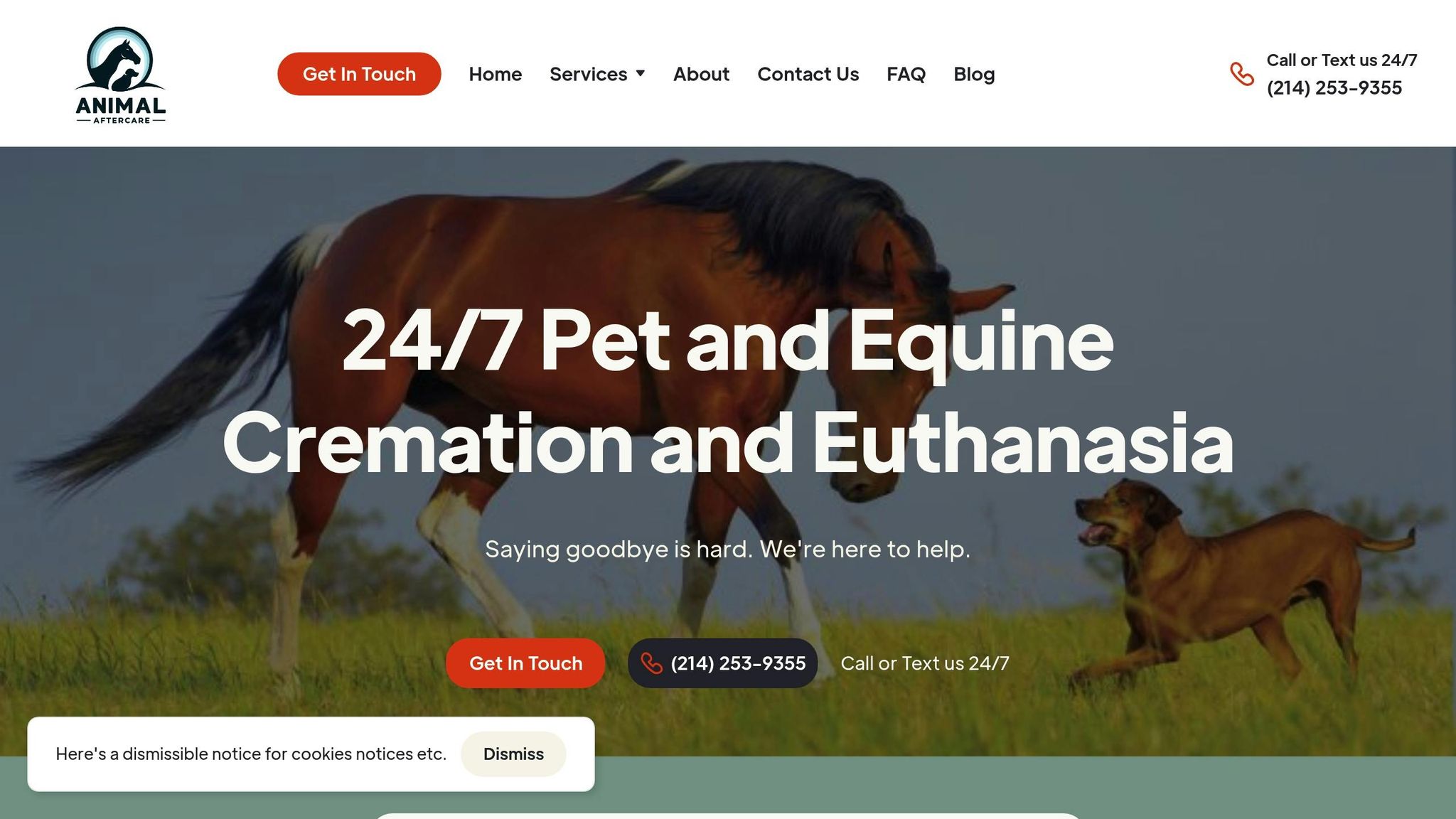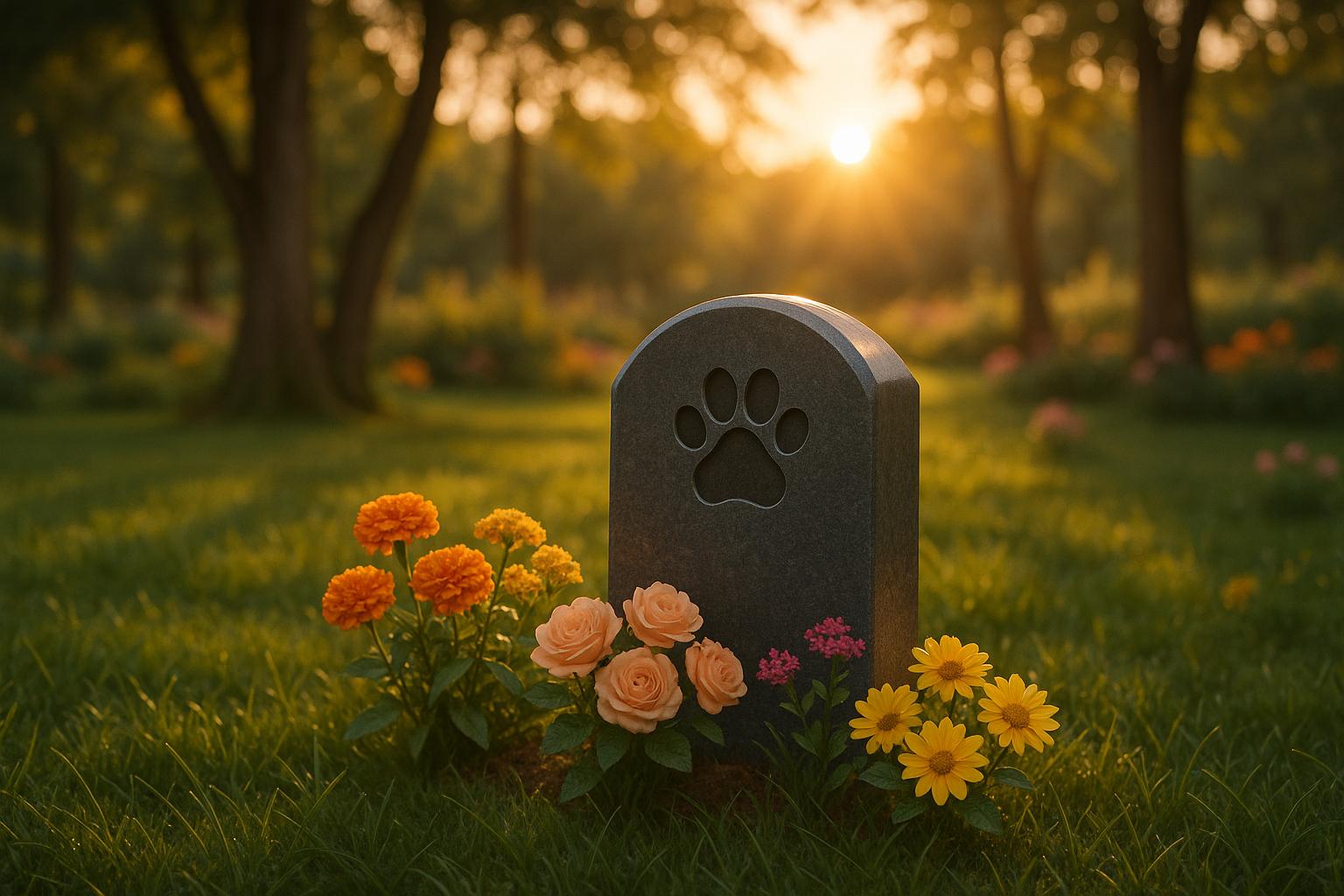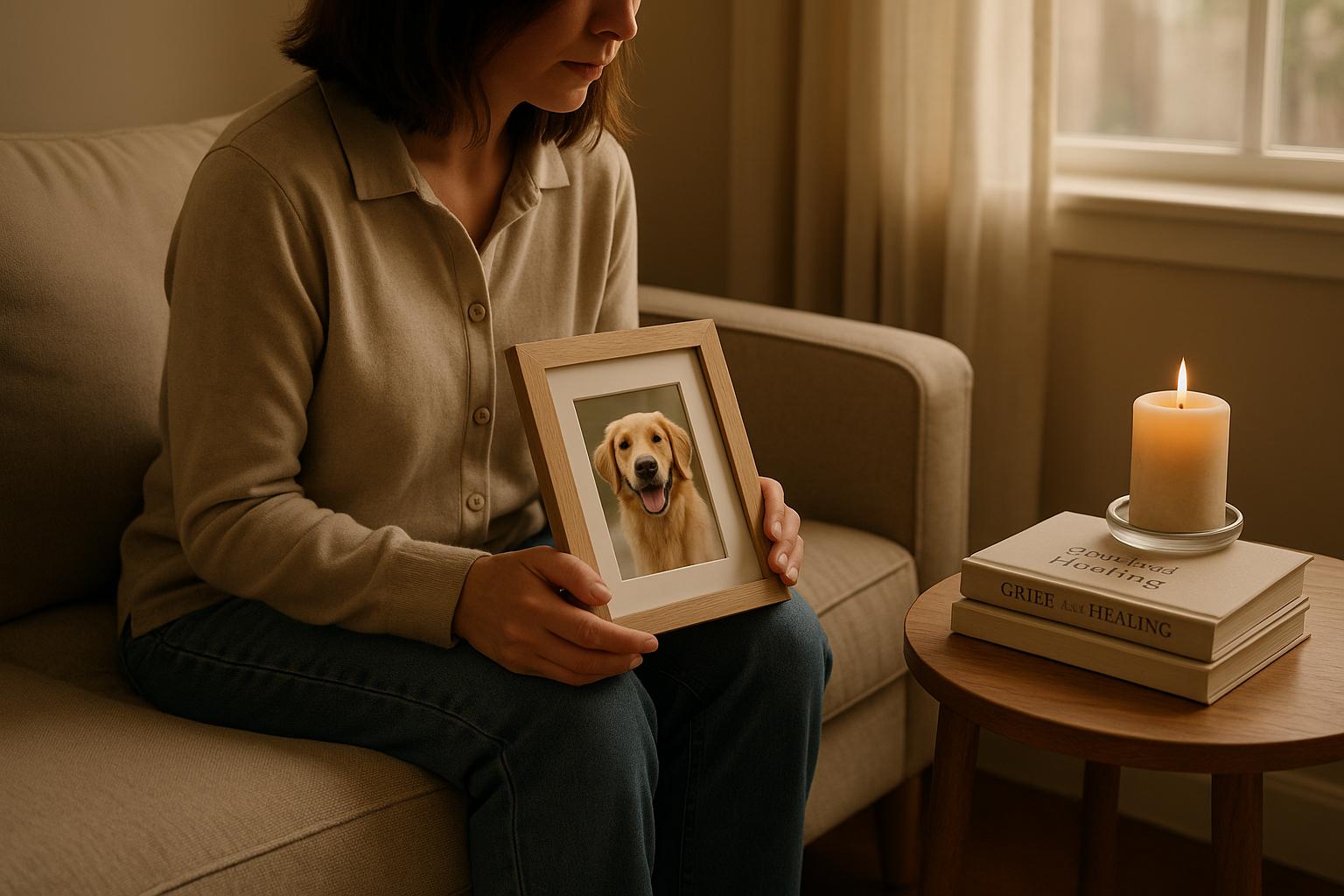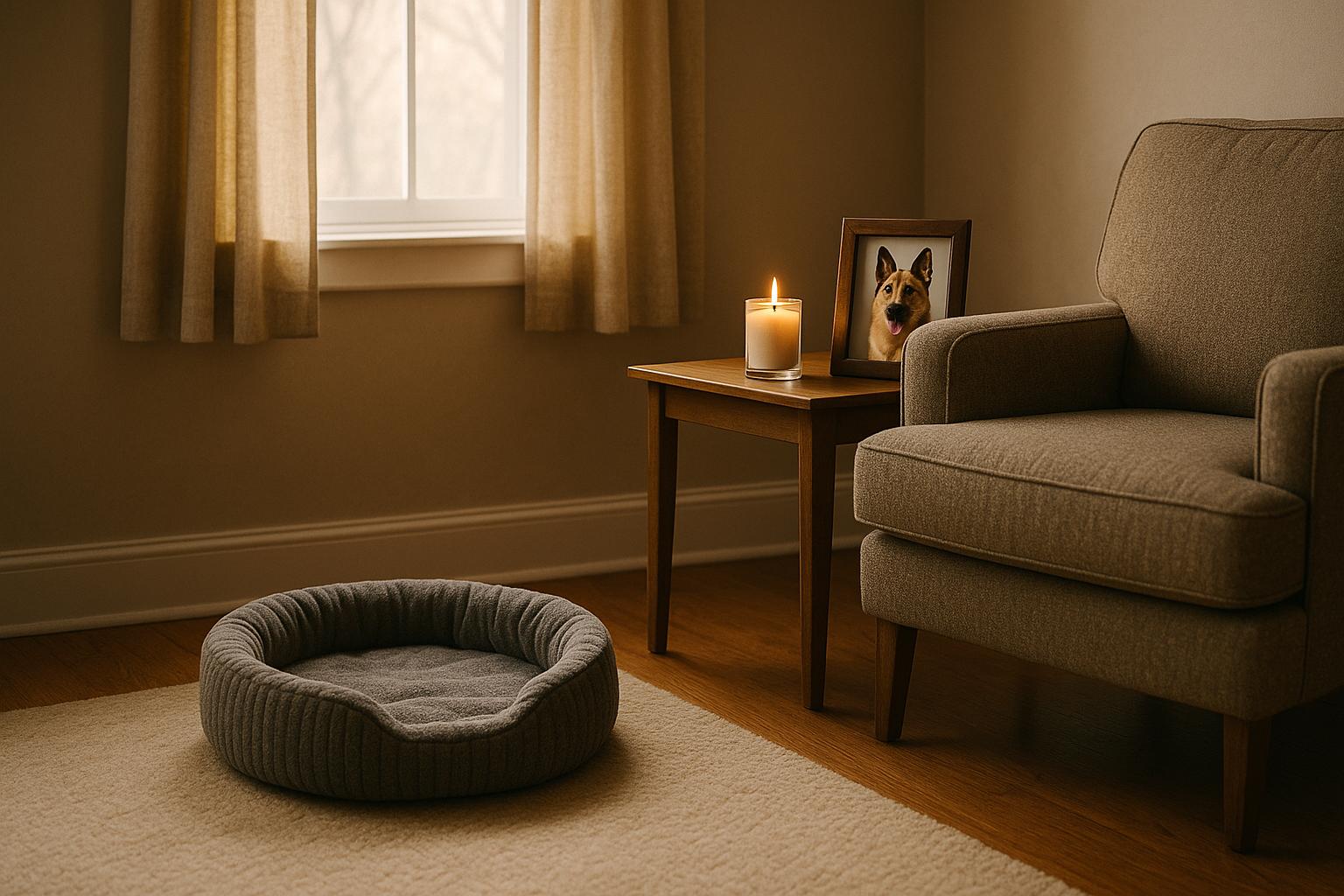When a pet passes away, deciding how to care for their remains can feel overwhelming. This guide simplifies the process by breaking down key aftercare options, including cremation, burial, and memorialization, to help you make informed choices. Here's what you need to know:
- Cremation: A popular option using high heat to reduce remains to ashes. Alternatives like water-based cremation (aquamation) are also available.
- Burial: Choose between home burial (subject to local laws) or professional pet cemeteries, which offer plots, headstones, and maintenance services.
- Memorials: Options include keepsakes, urns, digital tributes, and memory gardens.
- Legal Considerations: Local regulations may influence your decision, especially for burials and scattering ashes.
- Grief Support: Counseling and support groups can help you navigate the emotional impact of losing a pet.
Whether you prefer cremation, burial, or a personalized memorial, the goal is to honor your pet in a way that feels meaningful to you. Below, we dive deeper into these options and what to consider when choosing an aftercare provider.
What to do after your pet dies? Burial, cremation, and memorializing your pet
Pet Cremation Services
Pet cremation involves using intense heat, ranging from 1,400 to 2,000°F (760–982°C), to reduce a pet's remains to bone fragments and ash. It's a deeply personal decision, influenced by factors like emotions, costs, and the type of pet involved.
Cremation allows for meaningful ways to honor a pet's memory. Some choose to keep the ashes in an urn, scatter them in a special place, or even incorporate them into keepsakes. However, the irreversible nature of cremation can feel daunting to some pet owners. For those seeking alternatives, newer cremation methods provide additional ways to commemorate their beloved companions.
Special Cremation Options
One such alternative is aquamation, also known as alkaline hydrolysis or water cremation. This method offers a more environmentally conscious option compared to traditional cremation. By using water, alkaline chemicals, heat, and pressure, aquamation accelerates natural decomposition. It’s worth noting that this process uses only about 5% of the energy and produces roughly 10% of the carbon footprint of flame-based cremation.
Pet Burial and Cemetery Options
Pet burial offers a traditional and lasting way to honor your beloved companion. Unlike cremation, burial preserves the pet's uncremated remains, which many find comforting. However, this option requires careful consideration of legal and practical factors that vary widely across the United States.
Whether you choose to bury your pet at home or in a cemetery depends on several factors, including local laws, property ownership, budget, and personal preferences. Each option has its own set of benefits and challenges that are important to understand before making a decision. Below, we explore the details of both home and cemetery burial options.
Home Burials
If you're considering a home burial, it's essential to check local regulations and, if necessary, secure written permission. Rules can vary significantly depending on where you live and the type of property you own.
In rural areas, home burials are typically more accepted and legally permitted. However, urban and suburban areas often impose stricter laws, with many cities outright banning pet burials within city limits due to public health concerns and groundwater safety.
When planning a home burial, ensure the grave is at least 3 to 4 feet deep. This depth helps prevent scavengers from disturbing the site and aligns with most local health codes. Choose a location that is well-drained and unlikely to be affected by future construction.
Burying your pet at home can be deeply personal, offering a sense of closeness and comfort. However, it may pose challenges if you decide to move in the future. For those seeking professional services and memorialization, pet cemeteries are worth considering.
Pet Cemetery Burials
Pet cemeteries provide professional burial services, complete with ongoing maintenance and a variety of memorial options. These facilities function much like human cemeteries, offering designated plots, burial services, and customizable memorials.
The cost of a plot depends on the location and available amenities. In metropolitan areas, prices typically range from $400 to $1,500, while rural plots are more affordable, costing between $200 and $800. Larger pets require bigger plots, which can increase the overall cost. Burial services may include biodegradable caskets or shrouds for simplicity, while more elaborate options like wooden or metal caskets range from $50 for simple designs to over $500 for premium options.
For memorialization, simple flat markers start at $100 to $200, while upright granite headstones can range from $300 to $800 or more. Many cemeteries also offer engraving, photo ceramic inserts, and custom designs to personalize your pet's resting place.
Perpetual care fees ensure the grounds are maintained over time. These fees may be included in the initial plot cost or charged annually, typically ranging from $25 to $100.
Additional services offered by pet cemeteries often include viewing rooms for final goodbyes, memorial services, and grief counseling. Some facilities even provide seasonal decorations and host special memorial events throughout the year.
It's important to note that pet cemeteries don’t always have the same legal protections as human cemeteries. Some may face future development risks. When selecting a cemetery, verify its legal status and any protections in place to ensure the site remains undisturbed.
Burial Options Comparison
The table below highlights the key differences between home and cemetery burial options:
| Factor | Home Burial | Pet Cemetery Burial |
|---|---|---|
| Initial Cost | $50–$200 | $600–$2,500 |
| Ongoing Costs | None | $25–$100 annually |
| Legal Requirements | Varies by location | Professionally managed |
| Permanence | Depends on property | Generally permanent |
| Maintenance | Owner responsibility | Professional groundskeeping |
| Visiting Access | Always available | Cemetery hours apply |
| Memorial Options | DIY markers | Professional headstones |
| Moving Considerations | Difficult to relocate | Permanent location |
Choosing between home and cemetery burial often hinges on local regulations and long-term considerations. Home burial is ideal for rural property owners planning to stay in one place, while cemetery burial offers professional services and a permanent resting place, albeit with ongoing costs.
Keep in mind that burial should occur within 24 to 48 hours of your pet’s passing, especially in warmer weather. This tight timeline can make the decision-making process more challenging during an already emotional time.
sbb-itb-a4e988d
Pet Memorials and Grief Support
Losing a pet is one of the hardest experiences for any pet owner, and finding ways to honor their memory while seeking emotional support can be a meaningful part of the healing process. From heartfelt memorials to grief resources, there are many ways to cherish the bond you shared and navigate your feelings.
Memorial Options
Creating a memorial for your pet is a beautiful way to celebrate their life and keep their memory alive. You can choose from traditional options like urns made of wood, ceramic, or biodegradable materials, or go for something more personal like memorial jewelry that holds a small portion of your pet’s ashes. Custom keepsakes, such as engraved photo frames, commemorative stones, or clay paw prints, allow you to create a unique tribute.
For a more modern approach, digital memorials like online pages can be a touching way to share photos, stories, and memories with friends and family. Some pet owners also find comfort in planting a memorial tree or garden, a living tribute that grows and flourishes as a reminder of the love you shared. While these tangible memorials are important, addressing your emotional well-being is just as crucial.
Grief Support Resources
The grief that comes with losing a pet can be overwhelming, and finding support is essential. Pet loss counseling, often offered through community programs or veterinary schools, provides professional guidance to help you process your emotions. Many communities also host support groups and online forums where pet owners share their experiences and find solace in mutual understanding.
For immediate help, organizations like the ASPCA offer crisis support lines staffed by compassionate professionals who can provide both emotional support and practical advice. Books and other educational materials can also be helpful, offering insights into the grieving process. For families with children, resources designed specifically for younger audiences can help them understand and cope with the loss of a beloved pet.
Animal Aftercare's Support Services

Animal Aftercare is dedicated to helping pet owners through this difficult time with compassion and respect. Their 24/7 nationwide service includes a home collection option, allowing your pet’s final moments to be handled in the comfort of familiar surroundings.
To ensure the utmost care, Animal Aftercare uses a 100% assurance tagging system, so you can trust that your pet’s remains are treated with dignity every step of the way. Founded by Chris Koerner, Steven Hale, and Nik Hulewsky, the company was built on the belief that every pet deserves respectful treatment and every owner deserves empathetic support.
In addition to emergency cremation services for unexpected losses, the team provides referrals to local grief support resources and memorial service providers. Their goal is to help you navigate this challenging time with care and understanding, ensuring your pet is honored with the respect they deserve while you receive the support you need.
How to Choose an Aftercare Provider
Choosing an aftercare provider for your pet during such an emotional time can feel overwhelming. But knowing what to look for can help you make a decision that honors your pet’s memory and provides the support you need.
Key Factors to Consider
Start by thinking about availability and accessibility. Since loss can happen at any time, it’s important to choose a provider that offers 24/7 service. This ensures they can handle emergencies with compassion and professionalism. Providers with nationwide coverage are also a plus, as they can maintain consistent service quality no matter where you are.
Next, consider transparency and assurance systems. Look for a provider that guarantees you’ll receive your pet’s ashes, such as those using a 100% assurance tagging system. This can bring peace of mind during a difficult time.
Service options and flexibility are equally important. Some providers offer home collection services, which can make the process more comforting. Also, check if they provide personalized cremation services or emergency support to meet your specific needs.
Finally, staff experience and compassion can make a big difference. Providers with a skilled and empathetic team can guide you through every step with care and respect, helping ease some of the emotional burden.
Animal Aftercare's Services
Animal Aftercare is a great example of a provider that prioritizes these factors. Founded by Chris Koerner, Steven Hale, and Nik Hulewsky, the company operates on the belief that every pet deserves respectful treatment, and every pet owner deserves empathetic support.
Their services include 24/7 nationwide availability and the option for home collection, making the process as convenient and supportive as possible. They also use a 100% assurance tagging system, ensuring that your pet’s remains are carefully tracked and returned to you without any doubt.
Animal Aftercare offers cremation services for pets of all sizes, including specialized equine cremation for horse owners. Their compassionate and experienced staff are there to guide families through every step, ensuring the process is handled with care and dignity.
They also provide pet euthanasia services, performed by trained professionals who ensure your pet’s final moments are treated with the utmost respect.
Questions to Ask Providers
To ensure a provider meets your needs, here are some important questions to ask:
- Do you offer 24/7 emergency services and home collection options?
- How do you ensure that the ashes I receive are my pet’s, and what documentation do you provide?
- What are your complete fees, and are there any additional charges I should know about?
- What qualifications and experience do your staff have? How are they trained?
- Do you offer any additional support services to help families cope during this time?
Asking these questions can help you make an informed decision and find a provider that aligns with your needs during this deeply personal experience.
Conclusion: Honoring Your Pet
Final Thoughts
Losing a pet is one of the hardest experiences, but choosing aftercare that reflects your bond can bring a sense of comfort and peace. In this guide, we've looked at different ways to honor your pet - whether through individual cremation services that ensure their ashes are returned with care, burial options that create a lasting resting place, or memorial services that celebrate their life and legacy.
The most important thing is selecting an option that feels right for you and best honors the connection you shared. Whether it’s a simple cremation with a keepsake urn or a more elaborate memorial, each choice serves the same purpose: helping you find closure, offering comfort, and keeping your pet’s memory alive.
Grief is deeply personal, and there’s no set timeline for healing. The aftercare path you choose should align with your emotional needs and practical considerations. Some people find solace in keeping their pet’s ashes at home, while others prefer the permanence of a cemetery or the tranquility of a memorial garden. Whatever you decide, it should bring you peace and reflect the love you shared.
Next Steps
Now that you’ve explored the options, take the next step when you’re ready. Animal Aftercare provides the compassionate support and services discussed in this guide. Their team understands the importance of treating every pet with dignity and offering guidance to pet owners during such a difficult time.
Reaching out to a professional aftercare provider ahead of time can ease some of the stress when the moment comes. Knowing your pet’s final journey will be handled with care and respect can bring comfort. Every step of the way, your pet deserves the same love and attention they brought into your life.
FAQs
What makes aquamation a more environmentally friendly option compared to traditional cremation for pet aftercare?
Aquamation offers a cleaner and more planet-conscious alternative to traditional cremation. By using about 90% less energy and drastically cutting down carbon dioxide emissions, it stands out as a much gentler option for the environment. Unlike flame-based cremation, aquamation avoids releasing harmful chemicals or pollutants into the air.
Also known as alkaline hydrolysis, this process uses water and a mild solution to naturally break down a pet’s remains, leaving a smaller environmental footprint. It’s a meaningful way to honor a beloved pet while showing care for the planet.
How can I make sure the pet cemetery I choose will stay protected and undisturbed in the future?
To keep a pet cemetery safe and undisturbed, begin by looking into your local laws and regulations, as these can differ depending on your state or city. Make sure to select a licensed and reputable cemetery that adheres to all legal standards, including proper burial methods and any applicable environmental rules.
It’s also smart to secure documentation or proof of ownership for your pet’s burial plot. This can protect against any potential disputes or changes to the property in the future. If you’re uncertain about any legal matters, reaching out to a local attorney or the appropriate authorities can help clarify things and offer extra reassurance.
What should I think about when choosing between burying my pet at home or using a pet cemetery?
When choosing between a home burial and a professional pet cemetery, there are a few important things to keep in mind. First, check local laws - some areas have specific rules about burying pets at home. If home burial is allowed, make sure you have enough yard space and dig a grave that’s at least 3–4 feet deep to avoid issues like scavengers or potential contamination.
On the other hand, a pet cemetery provides a more organized option. These cemeteries often include services like memorial plaques or markers and ongoing care for the burial site. While this option is more regulated and convenient, it’s usually more expensive than a home burial. In the end, your choice should align with your personal values, practical considerations, and the way you want to honor your pet’s memory.







